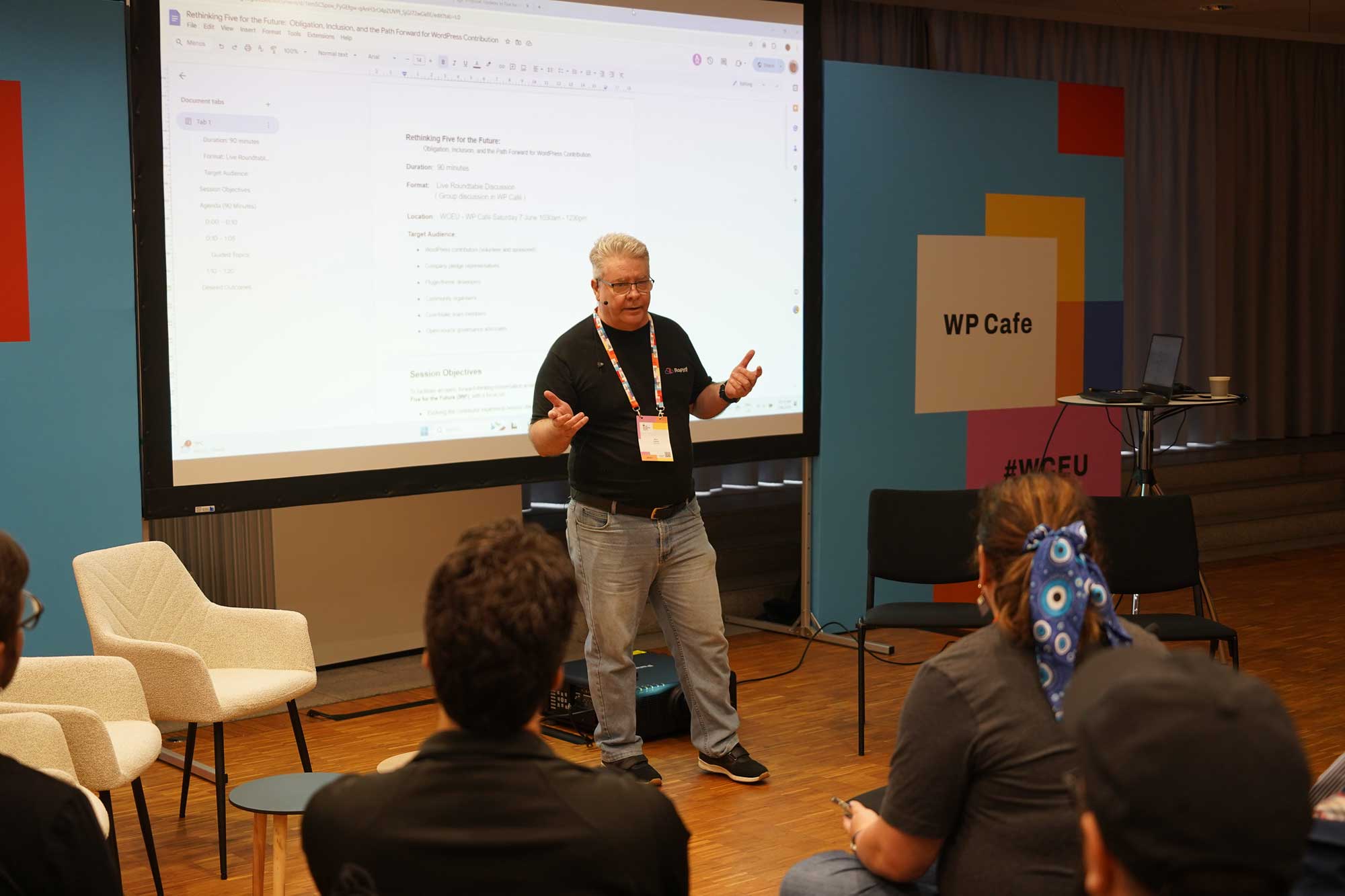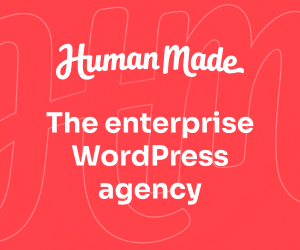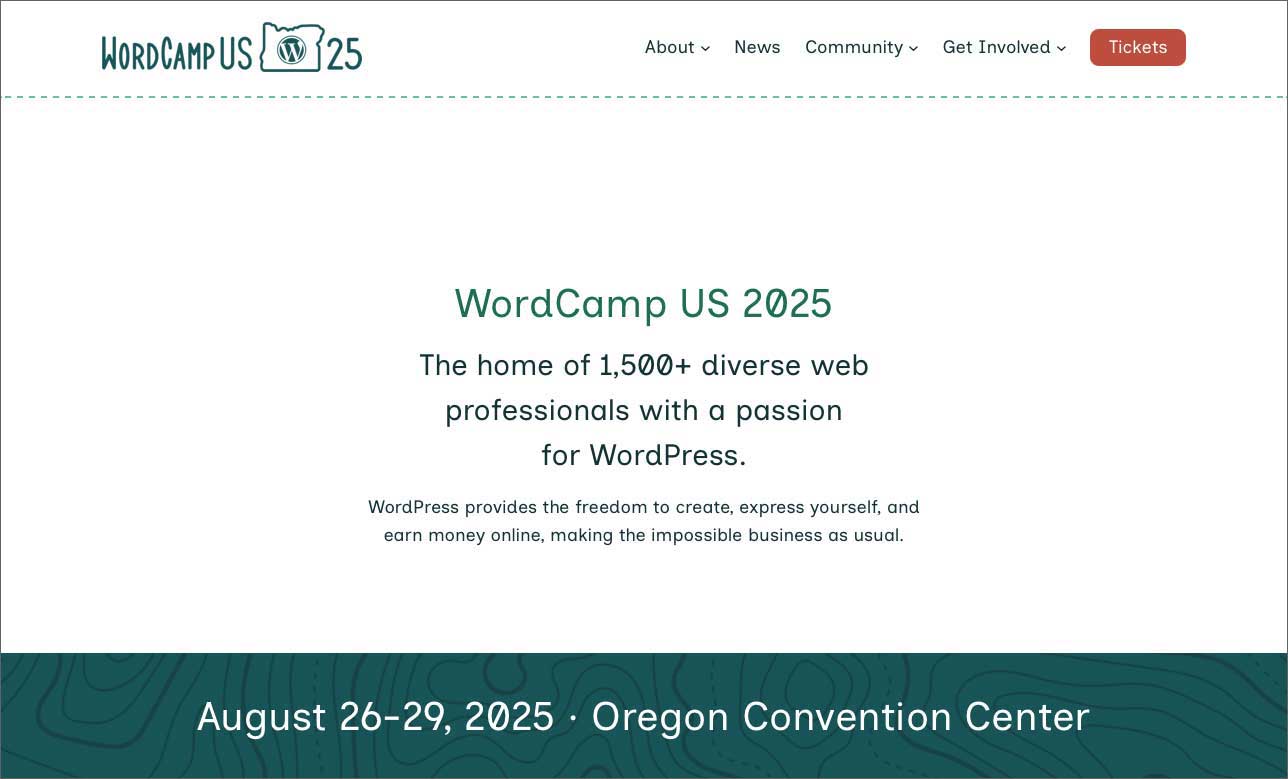After years of stalled conversations, a packed roundtable at WordCamp Europe 2025 has sparked fresh momentum to reform Five for the Future (5ftF), the initiative encouraging individuals and companies to give back 5% of their resources to the WordPress project. With WordPress Executive Director Mary Hubbard publicly supporting a reset and contributors rallying around clear proposals, many feel the moment to act is finally here.
“There’s a six-month window,” said Hosting Team contributor and Rapyd Cloud Managing Director Wes Tatters, who convened the roundtable, speaking to The Repository after the event. “We have a real opportunity to change how WordPress handles contributions, but we need to act swiftly. Otherwise, we’ll be having this same conversation again next year.”
This week, GoDaddy-sponsored contributor Courtney Robertson published a detailed recap of the Five for the Future WCEU25 chat on the WordPress Community Team blog, capturing community concerns, questions, and ideas for a “comprehensive reinvention” of 5ftF. The response was immediate and positive, highlighting both optimism and ongoing frustrations around the initiative’s past.
From obligation to measurable impact
Five for the Future has struggled with ambiguity since its inception in 2014. What exactly counts as a contribution? How should contributions be measured? Who decides what’s valuable? These uncertainties have bred confusion and frustration, prompting calls for clearer definitions and measurable outcomes.
Speaking at WCEU 2025 in a fireside chat with Mary Hubbard, WordPress co-founder Matt Mullenweg acknowledged the program’s key flaw: “We were measuring input, not output.” He proposed improving contributor profiles with analytics akin to GitHub to visibly demonstrate impact, aligning sponsored contributions better with WordPress project goals.
Yet deeper questions remain about how contributions are guided and valued. Former Automattic employee Samuel Sidler, in another critique of Mullenweg’s WCEU 2025 remarks published this week, argues that the problem runs deeper. He said WordPress currently lacks the infrastructure to meaningfully onboard sponsored contributors and guide their contributions effectively. “… two major ‘flaws’ in Five for the Future are who directs sponsored contributors, and how those contributors get ‘inside’ the circle of trust that is Automattic,” wrote Sidler.
Tatters echoed the concern: “Right now, it’s about how many hours you pledge. But what really matters is the impact — what’s the actual result?”
Recognizing all contributions
Another prominent theme of the roundtable and comments below Robertson’s write-up was the systematic undervaluing of non-code contributions like event organizing, mentorship, moderation, and marketing.
Long-time WordCamp organiser Laura Byrne captured a widely shared frustration in her comment: “Contributors performing ‘soft’ or non-technical work often remain invisible, leading to feelings of undervaluation,” she said. “Without documentation, marketers, comms professionals, event organizers… WordPress would not be where it is.”
Patricia Brun Torre, a WCEU 2025 organizer who helped facilitate the roundtable, reinforced this point, highlighting exaggerated pledge data as a barrier to trust.
“People do not trust [Five for the Future] because the numbers of hours pledged are ridiculous,” she told The Repository after the event, pointing to the Meta Team’s pledge of 797 contributors as one example that undermines credibility.
Trust, trademark, and tensions
Deeper anxieties around governance, transparency, and trademark enforcement underpin many community concerns about Five for the Future — particularly after it became public last October that Automattic had asked WP Engine for 8% of its annual revenue, or the equivalent in contributions to the WordPress project, to license the WordPress trademark.
Further reinforcing its point that WP Engine doesn’t give enough back to the project, Automattic reduced its own 5ftF pledge from 3,539 hours per week down to just 45 in January, matching WP Engine’s minimal pledge.
Tatters said incidents like this underscored longstanding concerns about the “weaponization” of 5ftF.
“It started as something voluntary, then became an implied obligation — and then it was turned into a weapon,” he said. “As soon as companies feel they’re being forced or shamed into contributing, you lose buy-in. We need to make it clear that this initiative is about positive, measurable impact — not leverage.”
In comments below Robertson’s recap, GoDaddy Senior Software Engineer Scott Kingsley Clark echoed these sentiments, emphasizing that without clear, fair, and transparent trademark enforcement, “whatever we do as a community to move forward… it will make the community and participants part of the same problem.”
An Operations Team to move things forward?
Speaking to The Repository, Tatters proposed establishing a new WordPress Operations Team: a cross-functional team responsible for coordinating measurable outcomes, onboarding and offboarding contributors, and building robust community infrastructure — essentially, a rebrand of the WordPress Sustainability Team.
“Instead of having the same circular conversations, we need an operations-focused group to deliver practical solutions,” Tatters said. “That way, we turn discussion into action.”
Contributor Gus Austin supported practical suggestions in his comments below Robertson’s recap. He recommended expanding the existing Contribution Health Dashboards project to include a credit system, clearly tracking contributions across code, documentation, events, and financial support — potentially increasing transparency and accountability for sponsors.
Is this time different?
Many contributors remain cautiously optimistic, encouraged by Hubbard’s willingness to openly back community-led reforms. Hubbard outlined clear, actionable steps in her comments this week, including better definition of impactful contributions, enhancing recognition and measurement systems, standardizing team structures, and decentralizing action.
“This is just a starting point, grounded in the ethos of ‘let’s just do,’” she wrote, calling on contributors to engage directly. “If folks are already working on any of this or want to help shape what’s next, let’s connect and keep the momentum going.”
For Tatters and many others, the difference between genuine reform and another round of missed opportunities hinges on quick follow-through.
“People are tired,” Tatters said. “If we don’t act now, contributors will lose patience. But if we do this right, we could fundamentally change WordPress contribution for the better.”
Feature image: Nilo Vélez, WordCamp Europe 2025.








Leave a Reply